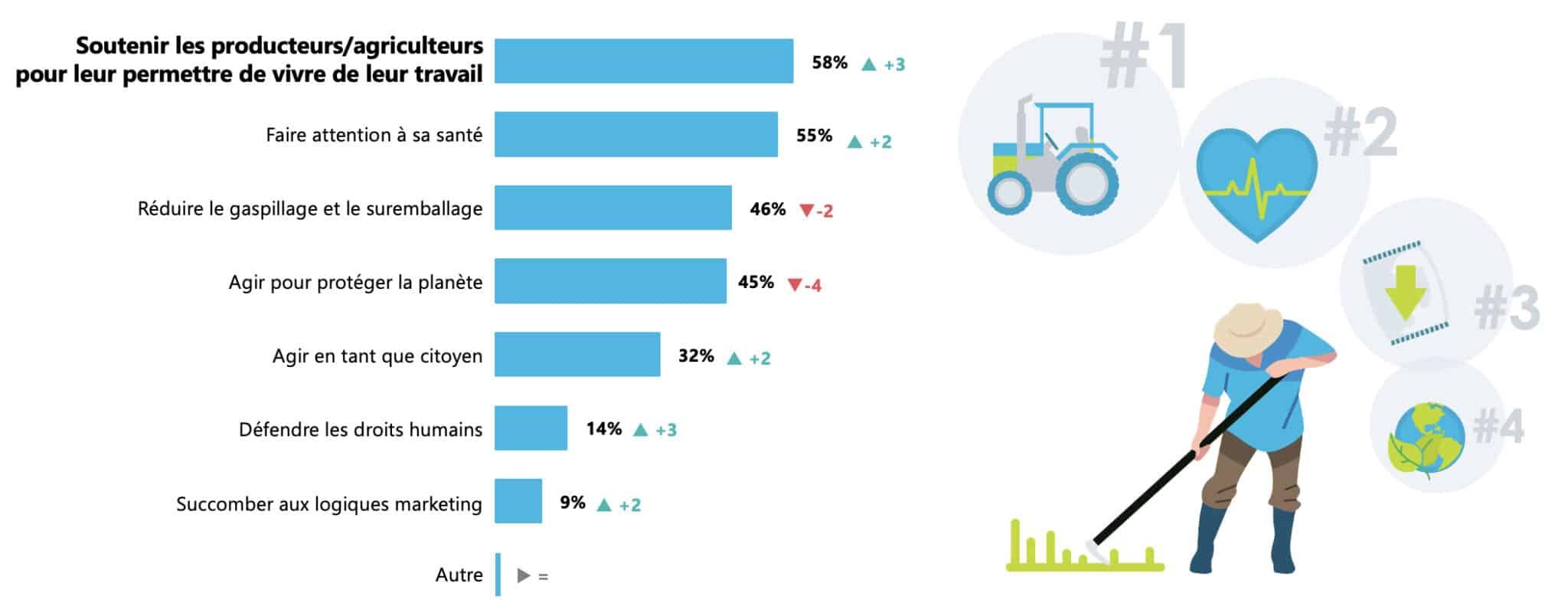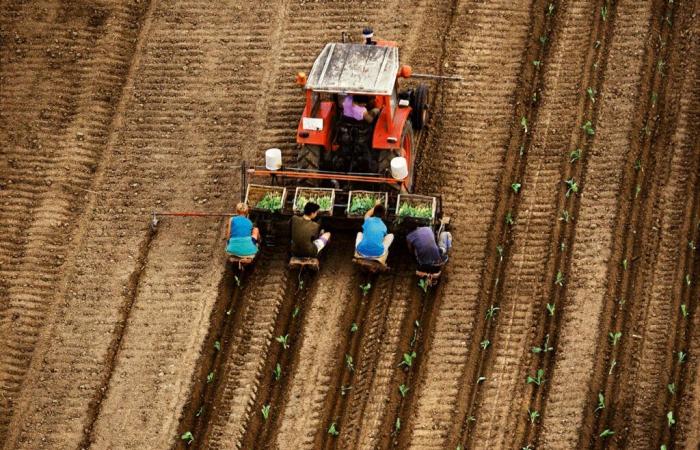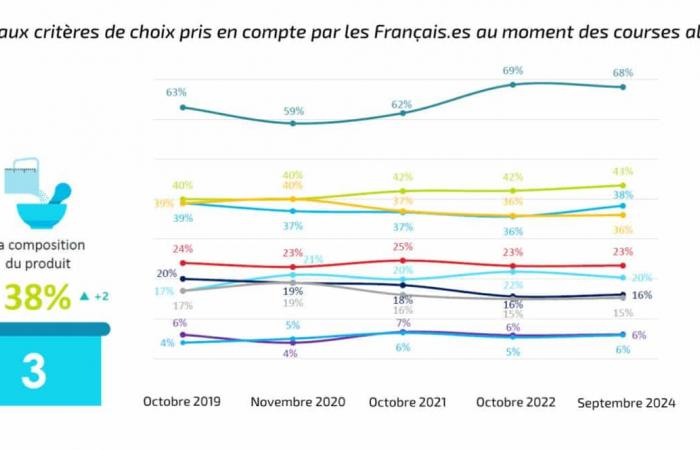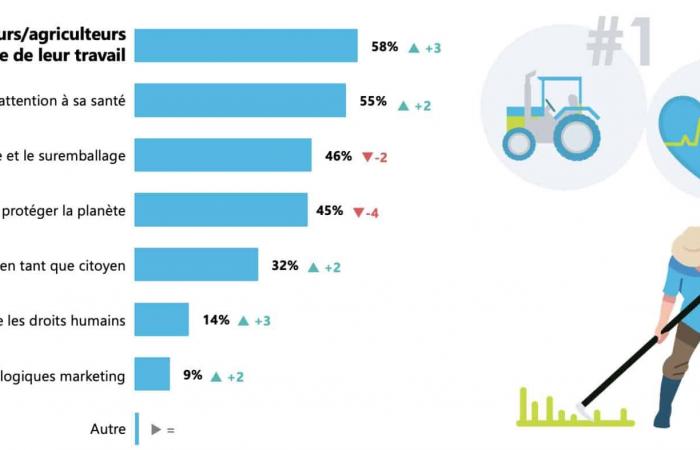When asked about their diet and consumption, French people say they consume more responsibly but that the price remains a major obstacle to more ethical purchases. 91% of them say they buy responsible food products at least once a month, 7 out of 10 once a week. Figures up slightly, despite inflation and the agricultural crisis, which testifies to the establishment of responsible consumption in habits, according to the 2024 edition of the Max Havelaar barometer of the food transition. « Since the creation of this barometer in 2019, we have noted that responsible consumption is taking hold, and is anchored on two aspirations: local and fair remuneration. », Declares Blaise Desbordes, general director of the NGO Max Havelaar France. However, 68% of respondents say that price remains their primary criterion for purchasing food products, ahead of taste (43%) and the composition of the product (38%).
The fair price must be compatible with the fair price
For three quarters (77%) of respondents, price is the main obstacle to their consumption of responsible food products. The price precisely reflects a double expectation not devoid of ambivalence between the concern not to spend too much while remunerating the producer fairly. For a majority of French people, companies must offer products that are reasonably priced (41%) and that guarantee fair remuneration for producers (41%). “ Consumers have used strategies to adapt to the inflationary situation through their choice of places of consumption in particular, but they aspire more than ever to “fair” prices, fair for them but also for producers. », writes Blaise Desbordes of Max Havelaar France, in the preamble to the 5e edition of this barometer of the food transition.
[À lire aussi Les Français prêts à réduire leur consommation de viande, selon un sondage du Réseau Action Climat]
“For three quarters of respondents, price is the main obstacle to their consumption of responsible food products”
In fact, it remains difficult to know, between declarations, actions and constraints linked to the cost of living as well as inflation, the attitude of the French in their consumption behavior. Nevertheless, the consumer has expectations in terms of transparency. In particular, knowing whether the work is well paid remains a concern. 3/4 of French people deplore a lack of information on the portion of the purchase price paid to producers. This raises requests since 7 out of 10 respondents would like more communication from companies and distributors on the part of the price paid to producers. Furthermore, notes the NGO Max Havelaar in the press release which accompanies the release of its barometer: “ the French are also looking for information on breeding conditions and animal welfare (63%) as well as the environmental impact of the food products they buy (61%). »
[À lire aussi La crise de la Bio en temps de malaise agricole]
+Infographic The motivations of French people to adopt responsible consumption taken from the Max Havelaar Food Transition Barometer – screenshot DR Max Havelaar France
Acting for responsible consumption
Taking into account animal welfare (27%) and the environment (26%) are among the expectations expressed by citizens regarding tomorrow’s food consumption.
“The various crises have obviously had an impact on the consumption patterns of the French, but support for farmers remains intact, after a start to the year which publicized their anger. The French clearly point out the need for a rebalancing of the sharing of value”calls out Blaise Desbordes, general director of the NGO Max Havelaar France. “ This is the question that is at the heart of fair value chains and the principle of floor prices. The responsibility of the agri-food sector is the transparency of margins; that of the Government is to fiscally support companies that pay the fair price to farmers. »
[À lire aussi Coopératives agricoles, la dérive d’un système]
“For a majority of French people, companies must offer products that are reasonably priced and that guarantee fair remuneration for producers. »
The barometer also asked respondents about their expectations in terms of regulation. Thus, half of those questioned believe that unfair competition constitutes an obstacle to the generalization of healthy and fair food. 54% of them are calling for restrictions on imports of foods that are not produced according to the social and environmental standards in force in France. In addition, 43% are in favor of minimum prices on agricultural products to guarantee a decent income for farmers.

This is because the French aspire to products that are beneficial for health and the environment. 36% of participants in the opinion study say this. Furthermore, a third (33%) “ of respondents highlight the importance of supporting the local economy ».
The results of the food transition barometer come from a survey carried out online by OpinionWay on two samples, of 2000 people, representative of the French population during September 2024 for the NGO Max Havelaar which defends and promotes fair trade.
Julien Leprovost
Did you like this article? It was written by one of our editors, support us by making a donation or by relaying it.
Are you interested in ecology? Register free to our newsletter weekly.
To go further
All barometers from Max Havelaar France
Max Havelaar Barometer of the food transition 2024
Also read on GoodPlanet Mag’
A guide to preserving your health and the planet at the same time
The 6th floor cook Nathalie George: “we have gone so far in the consumer society and the all-supermarket, we have to relearn how to consume differently”
What are the prospects for sustainable fishing?
Green Friday, Circular Monday, Giving Tuesday… or how to encourage responsible consumption during Black Friday
Michel Vampouille, president of Terre de Liens: “the revaluation of the basic professions which allow us to live is essential in all sectors of society, including in agriculture”
We will not be able to complete the ecological transition without regulating globalization
Concretely how do we do it in the kitchen… To bite into eco-friendly chocolate








